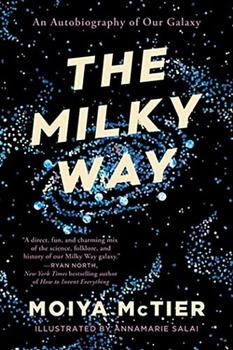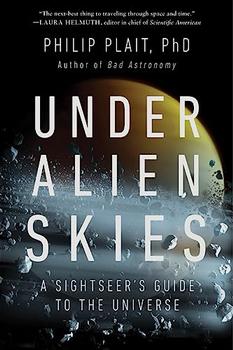Summary | Excerpt | Reviews | Beyond the book | Read-Alikes | Genres & Themes | Author Bio

An Autobiography of Our Galaxy
by Moiya McTierBooks about outer space can be the ultimate escape reading. Through their deliciously rendered explanations of sexy things like supernovas and black holes, we get a chance to fathom a world we can't otherwise conceive of. Moiya McTier, a physicist and folklorist, takes an unusual approach in The Milky Way, giving our galaxy the chance to narrate its own story.
I was initially skeptical of this concept, especially when I saw how often the Milky Way refers to human ignorance as a running theme throughout the book:
"That human-centric mindset will just make it harder for you to understand all that I am going to deign to teach you. If your question was more like, 'How can the Milky Way talk to me,' well, it's not like human language is that hard to learn. You're such simple creatures."
But the more I read, the more I liked it. As the book progresses, the tone becomes more vulnerable, lamenting the creation of failed stars, for instance. In one passage, the Milky Way beautifully describes a running flirtation with Andromeda, speculating on the two galaxies' predicted collision. I actually felt like I was watching a suspenseful love story unfold.
Along with giving information, the author often falls into passages of pure poetry. "As long as particles can move around and interact, nothing in space can truly die," she writes. Elsewhere, the galaxy muses "I am space; I am made of space; and I am surrounded by space," lending romance to a description of the galaxy's vastness.
McTier is a folklorist and science educator as well as an astrophysicist, and this book gives her the chance to blend the three. Some of my favorite parts were the references to cultural myths, taking readers on a tour through the Milky Way's other names around the world, like Silver River, Way of Birds, Straw Thief's Way and Deer Jump.
The Milky Way expresses fondness for the Mayan stories in which the cosmos plays a central role, unlike in most modern science fiction, for example. "First of all, you've turned me from a character into a setting. Instead of being a powerful god watching over you at night, I'm just the matter you fly through in your fancy ships," the galaxy narrates, underscoring the novelty of a first-person account. This emphasis on storytelling made the book's conceit all the more powerful.
I appreciated how thorough, yet easy-to-read McTier's book is. In addition to clearly describing the ways of celestial bodies, she also refers back to the work of past astronomers and the imaging that's made it possible to observe space. Our galaxy reminds us that astronomy is a science of observation, not experimentation. No wonder there have been so many impassioned arguments about the unknown sky. The 1920 Great Debate consisted of two astronomers arguing about the size of the cosmos. Later conflict arose when Alexander Friedmann controversially revised Einstein's work by positing that the universe is not static. Alongside the historical touchstones, McTier explains terms you may have heard but not understood, like "parsec," along with newer bits of jargon like "jansky," used by radio astronomers to refer to very dim areas.
I also liked the author's explanations of theories about how the Milky Way will end. She summarizes the most popular ones — including the Big Bounce, Big Freeze and Big Slurp — and analyzes their likelihood. Any of these endings won't occur for billions of years, of course, but it's still interesting to read about the competing ideas. I also love her assertion that the secret to understanding the Milky Way lies in understanding dark matter, which contributes so much to its mass. Dark matter, as McTier explains, is an unknown substance that doesn't emit, absorb or reflect light. It's the material pushing the expansion of the galaxy and is estimated to comprise 84% of the Milky Way's mass.
This book will definitely appeal to those who've watched Carl Sagan's Cosmos miniseries again and again, or checked out Neil Degrasse Tyson's reboot. Like those shows, this book merges education with — forgive the pun — the starry-eyed way outer space makes us feel.
However, The Milky Way will be a delightful read even for those who have no interest in the technicalities. As a poet, this book was a goldmine for me, with terms like "standard sirens" and "Purple Forbidden" providing inspiration. And the streams of matter in some black holes, our newfound ability to photograph event horizons — these sources of wonder keep us making myths about a realm we can only imagine.
![]() This review was originally published in The BookBrowse Review in October 2022, and has been updated for the
September 2023 edition.
Click here to go to this issue.
This review was originally published in The BookBrowse Review in October 2022, and has been updated for the
September 2023 edition.
Click here to go to this issue.

If you liked The Milky Way, try these:

by Samantha Harvey
Published 2024
A slender novel of epic power, Orbital deftly snapshots one day in the lives of six women and men hurtling through space - not towards the moon or the vast unknown, but around our planet.

by Philip Plait
Published 2024
A rip-roaring tour of the cosmos with the Bad Astronomer, bringing you up close and personal with the universe like never before.
Your guide toexceptional books
BookBrowse seeks out and recommends the best in contemporary fiction and nonfiction—books that not only engage and entertain but also deepen our understanding of ourselves and the world around us.